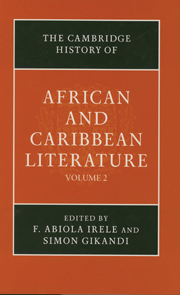Book contents
- Frontmatter
- 23 East African literature in English
- 24 Anglophone literature of Central Africa
- 25 West African literature in English: beginnings to the mid-seventies
- 26 South African literature in English
- 27 African literature in French: sub-Saharan Africa during the colonial period
- 28 North African literature in French
- 29 Francophone literatures of the Indian Ocean
- 30 African literature in Spanish
- 31 African literature in Portuguese
- 32 Popular literature in Africa
- 33 Caribbean literature in French: origins and development
- 34 Caribbean literature in Spanish
- 35 Anglophone Caribbean literature
- 36 The Harlem Renaissance and the Negritude movement
- 37 Postcolonial Caribbean identities
- 38 African literature and post-independence disillusionment
- 39 “Postcolonial” African and Caribbean literature
- 40 Modernism and Postmodernism in African literature
- Index
- References
37 - Postcolonial Caribbean identities
Published online by Cambridge University Press: 28 March 2008
- Frontmatter
- 23 East African literature in English
- 24 Anglophone literature of Central Africa
- 25 West African literature in English: beginnings to the mid-seventies
- 26 South African literature in English
- 27 African literature in French: sub-Saharan Africa during the colonial period
- 28 North African literature in French
- 29 Francophone literatures of the Indian Ocean
- 30 African literature in Spanish
- 31 African literature in Portuguese
- 32 Popular literature in Africa
- 33 Caribbean literature in French: origins and development
- 34 Caribbean literature in Spanish
- 35 Anglophone Caribbean literature
- 36 The Harlem Renaissance and the Negritude movement
- 37 Postcolonial Caribbean identities
- 38 African literature and post-independence disillusionment
- 39 “Postcolonial” African and Caribbean literature
- 40 Modernism and Postmodernism in African literature
- Index
- References
Summary
With the arrival of Christopher Columbus in the Caribbean in 1492 in his quest for the Indies and the subsequent extermination of the native population of this region, the definition of the region’s identity became an acute and abiding issue. The question of definition became further aggravated by the peculiar nature of the settlement of the Caribbean. Because of the need for repopulation of the islands of the Caribbean archipelago, plantation slavery and later schemes of indentureship left in their wake diverse groups of people who were cut off from their communities of origin. Out of the need for cheap labor to work the plantations, new and undefined cultural and social entities were produced. This phenomenon of ethnic and cultural heterogeneity was further intensified by prolonged periods of colonization. Caribbean societies are some of the oldest colonies in the west and cannot be accounted for without reference to the powerful shaping forces of colonialism. Nevertheless, because of their unusual hybrid genesis, they could neither be seen as “western” or an extension of Europe nor could they be considered “native,” that is distinctly “other.”
These new social and ethnic realities remained an oddity in western scholarship or simply emerged in terms of images of savage otherness: problematic, impure, and unpredictable creations of the ongoing process of historical change and world trade. They were initially relegated by early commentators to a kind of prehistoric timelessness that may have received its most notorious manifestation in the racial theorizing of Gobineau between 1835 and 1853.
- Type
- Chapter
- Information
- The Cambridge History of African and Caribbean Literature , pp. 785 - 796Publisher: Cambridge University PressPrint publication year: 2000
References
- 2
- Cited by



